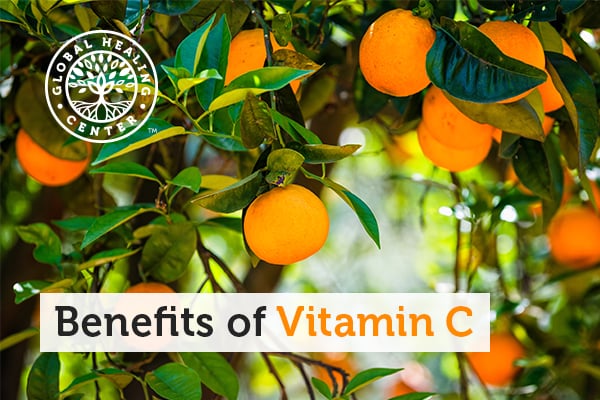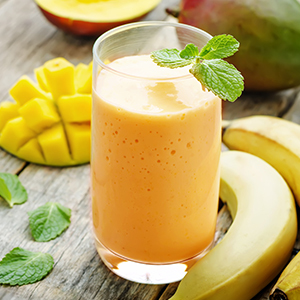
Vitamin C is an antioxidant present in many fruits and vegetables.[1] Also known as L-ascorbic acid, vitamin C has a wide variety of uses in the body. It supports normal growth and development and helps the body repair damaged tissue.[2, 3] Vitamin C also assists in the production of collagen, a protein that’s necessary for healthy skin, cartilage, tendons, ligaments, and blood vessels.[4]
To say that vitamin C is beneficial would be an understatement. It influences iron absorption and helps fight cell-damaging free radicals.[5] A 16-year study found that regular vitamin C supplementation promoted heart health.[6] Additionally, people who consume foods rich in vitamin C or other antioxidants may lower their risk of high blood pressure.[7, 8, 9]
High Doses of Vitamin C
In the 1970s, chemist and Nobel Peace laureate, Linus Pauling, proposed that high doses of vitamin C could help prevent the common cold.[9] Many people swear by Pauling's claim that vitamin C can boost the immune system naturally, but the research is still inconclusive.
A number of studies have examined whether high-dose vitamin C can provide extraordinary therapeutic results. Results thus far are inconclusive. However, animal studies have found that vitamin C may make traditional therapies more effective.[10]
Natural Dietary Sources of Vitamin C
Many types of food are fortified with vitamins and vitamin C is usually in the mix. However, like all vitamins, it’s best to get your daily intake from organic, natural sources and the best, natural sources of vitamin C are fruits and vegetables. Below are some of the best foods for vitamin C.[11]
| Sources of Vitamin C | |
|---|---|
| Food and Serving Size | Vitamin C (mg/serving) |
| Red or Yellow Bell Pepper, Raw, 1/2 cup | 95 |
| Orange Juice, 3/4 cup | 93 |
| Orange, 1 medium | 70 |
| Grapefruit Juice, 3/4 cup | 70 |
| Kiwifruit, 1 medium | 64 |
| Green Bell Pepper, raw, 1/2 cup | 60 |
| Broccoli, cooked, 1/2 cup | 51 |
| Strawberries, fresh, sliced 1/2 cup | 49 |
| Brussels sprouts, cooked, ½ cup | 48 |
| Grapefruit, ½ medium | 39 |
| Broccoli, raw, ½ cup | 39 |
| Tomato juice, ¾ cup | 33 |
| Cantaloupe, ½ cup | 29 |
| Cabbage, cooked, ½ cup | 28 |
| Cauliflower, raw, ½ cup | 26 |
| 1 Lemon Yield, 48g | 18.6 |
| Potato, baked, 1 medium | 17 |
| Tomato, raw, 1 Medium | 17 |
| Spinach, cooked, 1/2 cup | 9 |
| Green peas, frozen, cooked, 1/2 cup | 8 |
Daily Intake of Vitamin C
The amount of vitamin C that a person needs may vary with factors like age or whether a person is smoking, pregnant, or even breastfeeding. These are the guidelines provided by the U.S. Office of Dietary Supplements:[12]
| Recommended Daily Allowances of Vitamin C | ||||
|---|---|---|---|---|
| Age | Female | Male | Pregnant female | Breastfeeding female |
| 0-6 months | 40 mg | 40 mg | N/A | N/A |
| 7-12 months | 50 mg | 50 mg | N/A | N/A |
| 1-3 years | 15 mg | 15 mg | N/A | N/A |
| 4-8 years | 25 mg | 25 mg | N/A | N/A |
| 9-13 years | 45 mg | 45 mg | N/A | N/A |
| 14-18 years | 65 mg | 75 mg | 80 mg | 115 mg |
| 19+ years | 75 mg | 90 mg | 85 mg | 120 mg |
Vitamin C Deficiency
A lot of people might think “scurvy” is just pirate lingo, but it’s actually a disease caused by a lack of vitamin C. Symptoms of scurvy include fatigue, gum disease, anemia, scaly skin, and easy bruising.[7] Vitamin C deficiency is uncommon in the United States these days but some people remain at risk.[13]
People who get too little variety in their food may not receive adequate nutrition. Normally, when we hear "malnourished," many of us think "starving", but what it's more likely to mean is that a person is deficient in specific nutrients and it's affecting their health. Those who rely on a carnivorous diet might miss their daily quota for vitamin C as meat and dairy don’t contain much of this critical nutrient. Infants fed evaporated or boiled cow's milk may not get enough vitamin C, especially since cow’s milk is low in vitamin C, to begin with. Breast milk and infant formula are both better sources of vitamin C.
Some medical conditions can cause vitamin C deficiency. Digestive tract injuries or inefficiencies, genetic diseases, and other issues can negatively affect not just vitamin C absorption, but nutrient absorption as a whole.[13] Kidney disease and some types of cancer can also cause vitamin C deficiency.[14]
Smoking cigarettes is a bad idea for many reasons. One of the effects of the tissue damage it causes is the body using up vitamin C at a faster rate than normal. As a result, smokers and people exposed to second-hand smoke may need an extra 35 mg of vitamin C a day.[13]
Vitamin C Supplementation
Usually, if you follow a balanced diet with a foundation of organic fruits and vegetables, you’ll get all the vitamin C you need. If you don’t, vitamin C supplementation might be something to consider and discuss with your healthcare provider.
Be aware of the difference between synthetic and natural vitamins. Synthetic supplements are manufactured with unnatural ingredients and chemicals. They are made to mimic natural vitamins but not everyone is convinced of their efficacy. Conversely, natural supplements are made using ingredients drawn straight from their natural sources.
Vitamin C supplements are usually available as ascorbic acid, sodium ascorbate, or calcium ascorbate.[14] Synthetic and natural ascorbic acid have similar properties, but I always recommend a natural, plant-based source.[15, 16]
Global Healing’s Organic Plant-Based Vitamin C is a naturally powerful antioxidant that supports immune function, collagen and protein production, and a healthy response to inflammation. It contains ascorbic derived from organic plant sources, including amla (gooseberry), acerola fruit, Kakadu plum, camu camu , and rosehips.
References (16)
- "Vitamin C." MedlinePlus. U.S. National Library of Medicine, 9 Mar. 2016. Web. 11 Mar. 2016.
- Zeratsky, Katherine, R.D., L.D. "Too Much Vitamin C: Is It Harmful?" MayoClinic.org. Mayo Clinic, 5 Feb. 2015. Web. 11 Mar. 2016.
- "Wounds." University of Maryland Medical Center. University of Maryland, 5 Jan. 2015. Web. 11 Mar. 2016.
- Boyera, N., Galey , I. and Bernard, B.A. (1998), Effect of vitamin C and its derivatives on collagen synthesis and cross-linking by normal human fibroblasts. International Journal of Cosmetic Science, 20: 151–158. doi: 10.1046/j.1467-2494.1998.171747.x.
- Lynch, S. R. and Cook, J. D. (1980), INTERACTION OF VITAMIN C AND IRON. Annals of the New York Academy of Sciences, 355: 32–44. doi: 10.1111/j.1749-6632.1980.tb21325.x.
- Osganian, S.k., M.j. Stampfer, E. Rimm, and D. Spiegelman. "Vitamin C and Risk of Coronary Heart Disease in Women." ACC Current Journal Review 12.5 (2003): 27. PubMed. Web.
- "Vitamin C (Ascorbic Acid)." University of Maryland Medical Center. University of Maryland, 16 July 2013. Web. 11 Mar. 2016.
- Juraschek, Stephen P et al. “Effects of Vitamin C Supplementation on Blood Pressure: A Meta-Analysis of Randomized Controlled Trials.” The American Journal of Clinical Nutrition 95.5 (2012): 1079–1088. PMC. Web. 11 Mar. 2016.
- Ness, A. R., D. Chee, and P. Elliott. "Vitamin C and Blood Pressure–an Overview." J Hum Hypertens Journal of Human Hypertension 11.6 (1997): 343-50. PubMed. Web. 11 Mar. 2016.
- "High-Dose Vitamin C." National Cancer Institute. National Cancer Institute, 11 Dec. 2015. Web. 11 Mar. 2016.
- Bobroff, Linda B., and Isabel Valentin-Oquendo. "Facts About Vitamin C." University of Florida IFAS Extension. University of Florida, n.d. Web. 11 Mar. 2016.
- "Vitamin C Fact Sheet for Health Professionals." National Institutes of Health. U.S. Department of Health & Human Services, 11 Feb. 2016. Web. 11 Mar. 2016.
- "Vitamin C Fact Sheet for Consumers." National Institutes of Health. U.S. Department of Health & Human Services, 17 Feb. 2016. Web. 11 Mar. 2016.
- Hoffman, Freddie Ann. "Micronutrient Requirements of Cancer Patients." Cancer 55.S1 (1985): 295-300. PubMed. Web. 11 Mar. 2016.
- "Micronutrient Information Center: Vitamin C: Supplemental Forms." Linus Pauling Institute. Oregon State University, 27 Nov. 2013. Web. 11 Mar. 2016.
- Yung, Susanna, Michael Mayersohn, and J. Barry Robinson. "Ascorbic Acid Absorption in Humans: A Comparison among Several Dosage Forms." Journal of Pharmaceutical Sciences 71.3 (1982): 282-85. PubMed. Web. 11 Mar. 2016.
†Results may vary. Information and statements made are for education purposes and are not intended to replace the advice of your doctor. If you have a severe medical condition or health concern, see your physician.







